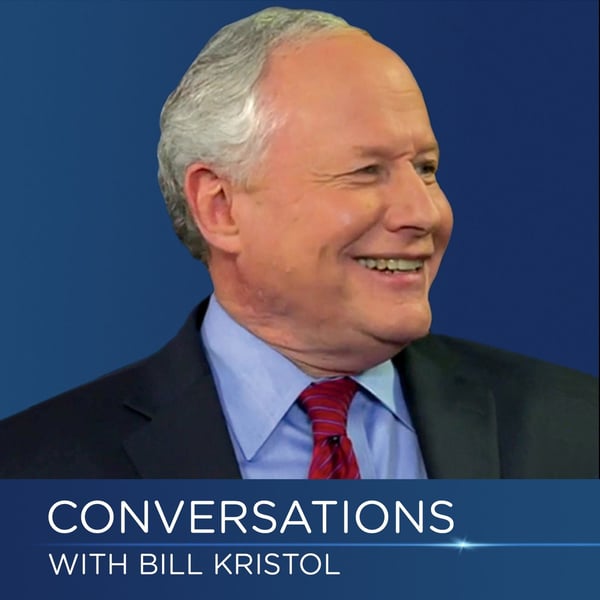Leon Kass on the Book of Exodus
Conversations with Bill Kristol
Conversations with Bill Kristol
4.7 • 1.7K Ratings
🗓️ 24 March 2021
⏱️ 69 minutes
🧾️ Download transcript
Summary
Transcript
Click on a timestamp to play from that location
| 0:00.0 | Hi, I'm Bill Crystal. Welcome back to Conversations. I'm very pleased to be joined again today by my good friend, Leon Cass. We've had a couple of conversations. |
| 0:25.0 | One with Leon is late wife Amy, on education and courtship, as I recall, and a second on a variety of topics, natural science, religion, Athens and Jerusalem, both of which I highly recommend, and those were a few years ago. |
| 0:38.0 | So I'm very glad we're able to get Leon to return and discuss his new book on Exodus, and called Founding Gods Nation. |
| 0:49.0 | And not just discuss his book, but discuss Exodus and issues raised by the biblical book of Exodus. But anyone should read Founding Gods Nation, which is now out for Yale Press, and they should also go back and read Leon's book on Genesis, of course. |
| 1:04.0 | Of course, the beginning of wisdom, then you can go read the rest of the works of Leon Cass, and we can come back in a couple of years. If you have nothing to do for the next two years, read them with the care they deserve, and then come back and we'll talk. Anyway, Leon, thanks for joining me. |
| 1:19.0 | Bill, thanks for having me nice to be with you again. |
| 1:22.0 | It's great to have you. So you read on Genesis, I was hard to believe it was about 16, 17 years ago that book came out, and now you've written on Exodus. |
| 1:32.0 | And so why, I guess, but also what have you learned in your long, in your many years of really careful study of this amazing book of the Bible? |
| 1:44.0 | Well, I went to Exodus partly because I wanted to see what happened next. I mean, in Genesis, we see how after treating all human beings, all humankind united, God sets out to find a toehold for his preferred way of life for human beings with Abraham, and it barely survives through the three patriarchal generations. |
| 2:11.0 | And at the end of Genesis, the children of Israel are down in Egypt, and it's going to be in Egypt where they go from family to nation and where the foundations of the nation are laid. |
| 2:27.0 | So I started reading Exodus in the hope of trying to see what is this national founding, and because I read the texts sort of philosophically and not just historically, I'm reading it for its possible wisdom on the question of what makes a people a people, what forms its communal identity, what holds it together, what guides its life, what do the people look up to? |
| 2:57.0 | What should they aspire to? And it was with those sort of questions of political philosophy that I undertook the study of Exodus. |
| 3:07.0 | Like the Genesis book, it was also a teaching book. I learned most of what I learned from teaching it in class. |
| 3:16.0 | 10 weeks, four hours a week, line by line, and I learned some answers to those questions, but I got some new questions and learned some surprising things that I never expect that I would learn from Exodus. |
| 3:33.0 | Maybe we can talk about some of those. |
| 3:36.0 | I'd love to. Yeah, I know it's one of the great, and just reading your book, and I don't know actually as well, but there are so many questions raised that were, as you say, as important to the senses, whatever tentative conclusions one might come to. |
| 3:49.0 | So what, I mean, I guess that would be, well, I'll just mention you mentioned God seeks a toehold for his nation, and then you describe your interest in Exodus as being sort of lessons for the founding of a nation of a people. |
| 4:02.0 | But how, how much are these lessons generalizable? I mean, how much is this about Israel, which is a pretty special people in, in the Bibles account, at least a holy nation and so forth? |
| 4:14.0 | And how much is it applicable beyond what's the relation of the particular and the universal? Maybe that's something to begin with. |
| 4:21.0 | That's, you know, large, large question, and that's that we should get in the deep water right away. |
| 4:29.0 | I mean, my view is, and it's supported by the text itself, my view is that Israel is a particular nation, but with a universal teaching, and it's deliberately that way. |
| 4:43.0 | So when God takes up with Abraham to begin with, he says to Abraham, all the nations of the world will be blessed in you. |
... |
Please login to see the full transcript.
Disclaimer: The podcast and artwork embedded on this page are from Conversations with Bill Kristol, and are the property of its owner and not affiliated with or endorsed by Tapesearch.
Generated transcripts are the property of Conversations with Bill Kristol and are distributed freely under the Fair Use doctrine. Transcripts generated by Tapesearch are not guaranteed to be accurate.
Copyright © Tapesearch 2025.

